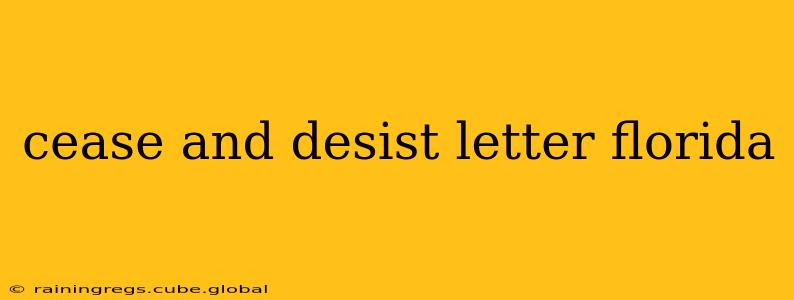A cease and desist letter in Florida, like in other states, is a formal legal notice demanding that a recipient stop engaging in specified activities. Ignoring such a letter can lead to significant legal repercussions. This guide will explore cease and desist letters in Florida, addressing common questions and providing crucial information for both senders and recipients.
What is a Cease and Desist Letter in Florida?
A Florida cease and desist letter is a written communication sent by an individual or entity to another, demanding that the recipient immediately stop a specific action or activity that the sender believes is unlawful or infringes upon their rights. This could range from intellectual property infringement (like copyright or trademark violations) to breach of contract, defamation, or unfair competition. The letter typically outlines the alleged wrongdoing, the legal basis for the claim, and the demand for immediate cessation. Failure to comply can result in further legal action, including lawsuits.
What Should Be Included in a Florida Cease and Desist Letter?
A well-crafted cease and desist letter in Florida should contain the following:
- Clear Identification of the Parties: Include the full legal name and contact information (address, phone number, email) of both the sender and the recipient.
- Specific Allegations: Clearly and concisely describe the alleged wrongful conduct. Be specific; avoid vague accusations. Provide dates, times, and supporting evidence whenever possible.
- Legal Basis for the Claim: Explain the legal grounds for the cease and desist demand. This might involve referencing specific statutes, case law, or contractual obligations.
- Demand for Cessation: Clearly state the specific actions the recipient must cease and desist from. This needs to be unambiguous and easily understood.
- Demand for Remedial Action (Optional): You might demand further actions beyond simply ceasing the wrongful conduct. This could include a retraction of false statements, removal of infringing materials, or payment of damages.
- Warning of Legal Action: Explicitly warn the recipient that failure to comply will result in further legal action, including lawsuits for damages, injunctive relief, and attorney’s fees.
- Deadline for Response: Specify a reasonable deadline for the recipient to respond and confirm their compliance.
How to Respond to a Florida Cease and Desist Letter?
Receiving a cease and desist letter can be daunting. Ignoring it is not advised. Your best course of action is:
- Do Not Panic: Seek legal counsel immediately. An attorney can advise you on the best course of action.
- Review Carefully: Thoroughly review the letter with your attorney. Understand the specific allegations and the legal basis for the claim.
- Gather Evidence: Collect any documents or information that might support your defense.
- Consult an Attorney: This is crucial. An attorney specializing in the relevant area of law (e.g., intellectual property, contract law) will help you craft a thoughtful and strategic response.
What Happens if You Ignore a Florida Cease and Desist Letter?
Ignoring a cease and desist letter is risky. The sender can pursue legal action, which may result in:
- Lawsuits: This can involve significant legal costs and potential financial penalties.
- Injunctive Relief: A court order compelling you to stop the specified activity.
- Damages: Compensation for losses incurred by the sender due to your actions.
- Attorney's Fees: You may be ordered to pay the sender’s legal fees.
Can I Write My Own Cease and Desist Letter in Florida?
While you can draft a letter yourself, it's strongly recommended to seek legal counsel. A poorly written letter can weaken your position and potentially harm your case. An attorney ensures the letter is legally sound, properly formatted, and effectively communicates your demands.
What are the Different Types of Cease and Desist Letters in Florida?
Cease and desist letters can address various legal issues, including:
- Intellectual Property Infringement: Copyright, trademark, and patent violations.
- Breach of Contract: Violation of terms agreed upon in a contract.
- Defamation: False statements that damage someone's reputation.
- Unfair Competition: Business practices that violate fair competition laws.
This information is for educational purposes only and does not constitute legal advice. Always consult with a qualified Florida attorney for advice regarding your specific situation.
